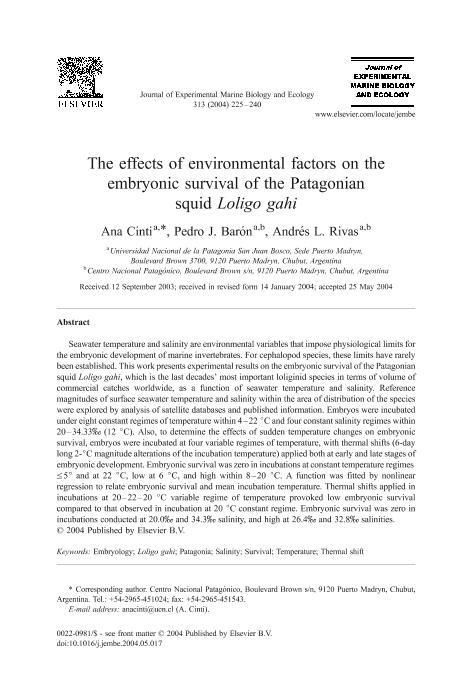Mostrar el registro sencillo del ítem
dc.contributor.author
Cinti, Ana

dc.contributor.author
Baron, Pedro Jose

dc.contributor.author
Rivas, Andres Lujan

dc.date.available
2020-05-05T20:29:51Z
dc.date.issued
2004-12
dc.identifier.citation
Cinti, Ana; Baron, Pedro Jose; Rivas, Andres Lujan; The effects of environmental factors on the embryonic survival of the Patagonian squid Loligo gahi; Elsevier Science; Journal of Experimental Marine Biology and Ecology; 313; 2; 12-2004; 225-240
dc.identifier.issn
0022-0981
dc.identifier.uri
http://hdl.handle.net/11336/104292
dc.description.abstract
Seawater temperature and salinity are environmental variables that impose physiological limits for the embryonic development of marine invertebrates. For cephalopod species, these limits have rarely been established. This work presents experimental results on the embryonic survival of the Patagonian squid Loligo gahi, which is the last decades' most important loliginid species in terms of volume of commercial catches worldwide, as a function of seawater temperature and salinity. Reference magnitudes of surface seawater temperature and salinity within the area of distribution of the species were explored by analysis of satellite databases and published information. Embryos were incubated under eight constant regimes of temperature within 4–22 °C and four constant salinity regimes within 20–34.33‰ (12 °C). Also, to determine the effects of sudden temperature changes on embryonic survival, embryos were incubated at four variable regimes of temperature, with thermal shifts (6-day long 2-°C magnitude alterations of the incubation temperature) applied both at early and late stages of embryonic development. Embryonic survival was zero in incubations at constant temperature regimes ≤5° and at 22 °C, low at 6 °C, and high within 8–20 °C. A function was fitted by nonlinear regression to relate embryonic survival and mean incubation temperature. Thermal shifts applied in incubations at 20–22–20 °C variable regime of temperature provoked low embryonic survival compared to that observed in incubation at 20 °C constant regime. Embryonic survival was zero in incubations conducted at 20.0‰ and 34.3‰ salinity, and high at 26.4‰ and 32.8‰ salinities.
dc.format
application/pdf
dc.language.iso
eng
dc.publisher
Elsevier Science

dc.rights
info:eu-repo/semantics/openAccess
dc.rights.uri
https://creativecommons.org/licenses/by-nc-sa/2.5/ar/
dc.subject
EMBRYOLOGY
dc.subject
LOLIGO GAHI
dc.subject
PATAGONIA
dc.subject
SALINITY
dc.subject
SURVIVAL
dc.subject
TEMPERATURE
dc.subject
THERMAL SHIFT
dc.subject.classification
Zoología, Ornitología, Entomología, Etología

dc.subject.classification
Ciencias Biológicas

dc.subject.classification
CIENCIAS NATURALES Y EXACTAS

dc.title
The effects of environmental factors on the embryonic survival of the Patagonian squid Loligo gahi
dc.type
info:eu-repo/semantics/article
dc.type
info:ar-repo/semantics/artículo
dc.type
info:eu-repo/semantics/publishedVersion
dc.date.updated
2020-04-27T14:43:37Z
dc.journal.volume
313
dc.journal.number
2
dc.journal.pagination
225-240
dc.journal.pais
Países Bajos

dc.journal.ciudad
Amsterdam
dc.description.fil
Fil: Cinti, Ana. Universidad Nacional de la Patagonia "San Juan Bosco"; Argentina. Consejo Nacional de Investigaciones Científicas y Técnicas. Centro Nacional Patagónico; Argentina
dc.description.fil
Fil: Baron, Pedro Jose. Consejo Nacional de Investigaciones Científicas y Técnicas. Centro Nacional Patagónico; Argentina. Universidad Nacional de la Patagonia "San Juan Bosco"; Argentina
dc.description.fil
Fil: Rivas, Andres Lujan. Consejo Nacional de Investigaciones Científicas y Técnicas. Centro Nacional Patagónico; Argentina. Universidad Nacional de la Patagonia "San Juan Bosco"; Argentina
dc.journal.title
Journal of Experimental Marine Biology and Ecology

dc.relation.alternativeid
info:eu-repo/semantics/altIdentifier/doi/http://dx.doi.org/10.1016/j.jembe.2004.05.017
dc.relation.alternativeid
info:eu-repo/semantics/altIdentifier/url/https://www.sciencedirect.com/science/article/pii/S0022098104003235
Archivos asociados
